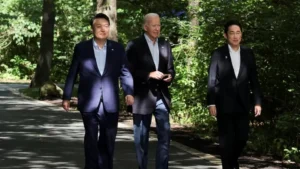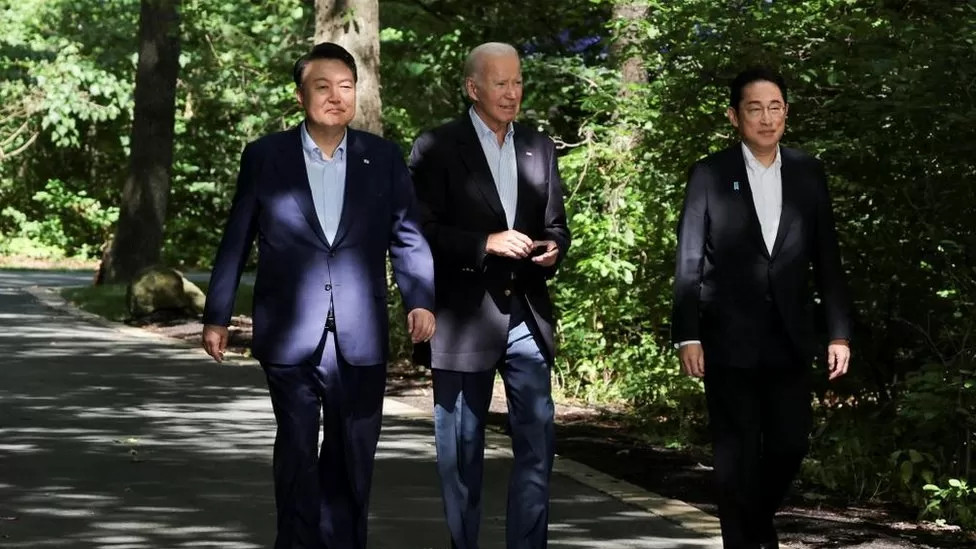US-Host Japan-SKorea summit a coup for Biden but will détente last?

In a significant diplomatic maneuver, the United States has successfully orchestrated a summit between Japan and South Korea, two East Asian powerhouses with a complex history of strained relations. While the meeting is undoubtedly a win for the Biden administration’s foreign policy objectives, the question on everyone’s minds remains: Can this détente truly stand the test of time?
A Diplomatic Feat for Biden
The US-hosted Japan-South Korea summit comes as a remarkable achievement for President Joe Biden’s administration. Given the longstanding historical and geopolitical tensions between the two nations, bringing them to the negotiation table is no small feat. The summit not only demonstrates the diplomatic finesse of the Biden team but also underscores their commitment to stabilizing regional dynamics and fostering cooperation among allies.
The timing of the summit is crucial, considering the various challenges that have been plaguing the Asia-Pacific region, including the North Korean nuclear issue, territorial disputes, and economic competition. By encouraging dialogue between Japan and South Korea, the US aims to create a united front that can address these complex issues while promoting stability and prosperity in the region.
A History of Strained Relations
While the summit represents a step forward, it’s essential to acknowledge the historical baggage that Japan and South Korea carry in their relationship. Deep-seated animosities stemming from Japan’s colonial rule over the Korean Peninsula and unresolved issues such as compensation for “comfort women” have often strained diplomatic ties.
Decades of historical grievances have periodically flared up, causing not only political tensions but also influencing public sentiment on both sides. These sensitivities have often made it difficult to foster lasting cooperation and genuine reconciliation.
A Fragile Détente
The optimism surrounding the US-hosted summit is tempered by the recognition that the road to lasting détente remains fraught with challenges. While both Japan and South Korea may be willing to engage in discussions under the umbrella of this diplomatic coup, reconciling their historical grievances and divergent national interests is a complex task that cannot be resolved overnight.
Past attempts at rapprochement have been met with setbacks, leaving many observers skeptical about the sustainability of any newfound cooperation. Even as both countries agree to collaborate on common goals, the real test lies in their ability to navigate through contentious issues that have long been a stumbling block.
The Role of the United States
As a facilitator of this historic meeting, the United States wields significant influence over the direction of Japan-South Korea relations. By leveraging its position as a trusted ally to both nations, the US has the potential to encourage productive dialogue and promote reconciliation.
However, it’s important to note that the summit also exposes the tightrope the United States must walk in balancing its role as a mediator while maintaining its own strategic interests. Ensuring that the interests of all parties are respected and protected will be a delicate dance that requires careful consideration.
The Way Forward
While the US-hosted summit marks a promising step forward, it’s clear that the path to lasting détente between Japan and South Korea is an arduous one. Genuine reconciliation requires addressing deep-rooted historical grievances, fostering mutual understanding, and finding common ground on contentious issues.
The success of this diplomatic endeavor will depend on the willingness of both nations to prioritize cooperation over confrontation, to set aside historical animosities for the greater good, and to work together toward a shared vision of stability and prosperity in the Asia-Pacific region.
As the world watches the aftermath of the summit unfold, it becomes evident that while this may be a pivotal moment, the journey toward lasting harmony is far from over. Time will tell whether the optimism generated by this diplomatic coup can evolve into a lasting and impactful chapter in the complex relationship between Japan and South Korea.
